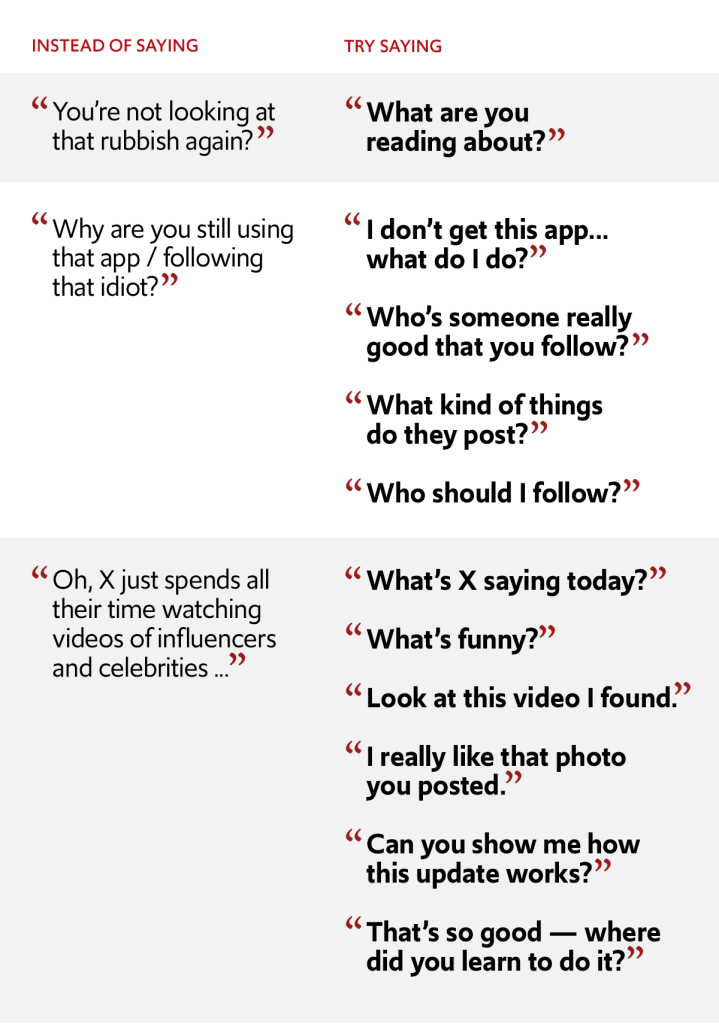If a child was reading a book, drawing or making something, or watching the TV, you might ask them about what they are doing, show an interest or even get involved.
Do the same with their internet use – showing them that you are interested in what they are reading, watching or doing online in a positive and open way will encourage them to share what they are doing, rather than treating it as something private and of no interest to anyone else.
Dismissing or mocking a platform or app your child enjoys using can lead to a child feeling ashamed of using it. They may be more likely to feel ‘guilty’ and be secretive about using certain apps or platforms – and they may use a device in secret (even if they’re doing it safely).
As they get older this secrecy can become a habit, possibly leaving them more vulnerable as they are less likely to be open, or may even lie about what they are doing.
Talk about the social media platforms and apps that you use, and show your child things which interest you, make you laugh or might be of interest to them. This will help them feel relaxed about sharing their life on social media with you too.
Use some of the same apps that your child does; follow one another and ask and share suggestions of who else to follow. Set up a family messaging group and use it to chat, but also to share silly memes, funny videos and images from other platforms.
If you’re struggling to use an app, or can’t get your head round a new update, ask your child to show you what to do, or work it out together.
“You’re not looking at that rubbish again?”; “Why are you still using that app / following that idiot?”; “Oh, X just spends all their time watching videos of influencers and celebrities.”
“What are you reading about?”; “Can you show me how to play that game?”; “I don’t get this app – what do I do?”; “Who’s someone really good that you follow?”; “What kind of things do they post?”; “Who should I follow?”; “What’s X saying today?”; “What’s funny?”; “Look at this video I found!”; “I really like that photo you posted.”; “Can you show me how this update works?”; “That’s so good – where did you learn to do it?”
These are some good places to find out more about social media, apps and platforms, including their characteristics and features:
If a child was reading a book, drawing or making something, or watching the TV, you might ask them about what they are doing, show an interest or even get involved.
Do the same with their internet use – showing them that you are interested in what they are reading, watching or doing online in a positive and open way will encourage them to share what they are doing, rather than treating it as something private and of no interest to anyone else.
Dismissing or mocking a platform or app your child enjoys using can lead to a child feeling ashamed of using it. They may be more likely to feel ‘guilty’ and be secretive about using certain apps or platforms – and they may use a device in secret (even if they’re doing it safely).
As they get older this secrecy can become a habit, possibly leaving them more vulnerable as they are less likely to be open, or may even lie about what they are doing.
Talk about the social media platforms and apps that you use, and show your child things which interest you, make you laugh or might be of interest to them. This will help them feel relaxed about sharing their life on social media with you too.
Use some of the same apps that your child does; follow one another and ask and share suggestions of who else to follow. Set up a family messaging group and use it to chat, but also to share silly memes, funny videos and images from other platforms.
If you’re struggling to use an app, or can’t get your head round a new update, ask your child to show you what to do, or work it out together.

These are some good places to find out more about social media, apps and platforms, including their characteristics and features:
Our downloadable guide for parents and carers.